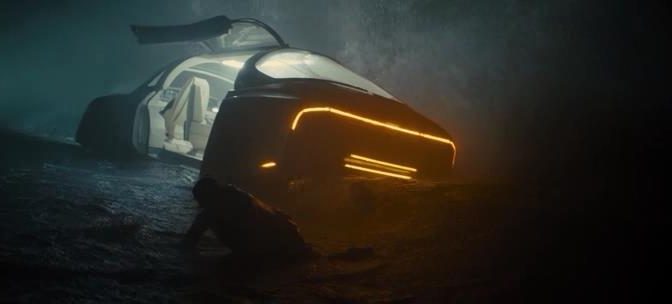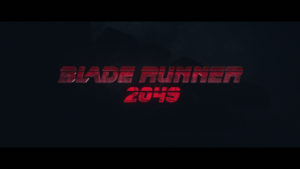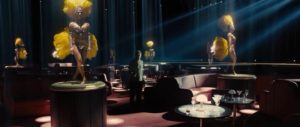The original 1982 film, Blade Runner, is one of the great cornerstones of science fiction cinema. Among its myriad virtues as a work of art, one that has been crucial in its growing reputation since the 1980s is how prescient it has been. Prescient both in establishing a lot of the aesthetic touchstones of the sci-fi genre and in its ideas about the evolving relationship between human beings and technology. From rapid developments in the “I” portion of AI to ongoing conversations about how filtering life through a digital lens either erodes or enhances human socialization, Blade Runner’s musings about the uneasy nexus between humanity and machinery seem to grow more topical by the day. Ridley Scott’s Blade Runner debuted to relative shrugs a full thirteen years before the Internet would make its grand popular entrance in a flurry of AOL Free Trial CDs and by the time Facebook arrived in 2004 to declare that we would all henceforth live on the Internet, it had basically become something of a grizzled elder statesman. It makes all the sense in the world that our times should have their own Blade Runner film, but it was also a real risk to make one. It’s a dicey move to build upon any well-regarded film, much less a groundbreaking, ceaselessly influential genre classic. There were a lot of variables that could have gone awry. Young French-Canadian director Denis Villeneuve is an immensely talented filmmaker, who proved only last year, with the beautiful and haunting Arrival, that he knows how to craft a science fiction world that has both epic scope and a rich sense of emotion and tone. Still, he is still early in his career and this is no less than one of the sacred texts of modern pop culture. That first film is mentioned in the same hushed tones as the first two brilliant Star Wars films and it brings with it the added challenge of being the thornier, colder, more idiosyncratic cousin to those films. The chance of some turbulence in revisiting this most moody and cerebral of sci-fi worlds was all but guaranteed, and I adjusted my expectations accordingly. It is quite a relief then to say that Blade Runner 2049 is not simply a case of failure averted. This is a major piece of work and the blessed case of a blockbuster with peerless art film credentials. It is beautiful and bracing and cool, and if I cannot yet commit to call it a full-stop brilliant film, then so be it. That does not tarnish its beauty. If anything, all it does is move it even closer into the company of its predecessor; a film to inspire appreciation and awe and just a little bit of puzzlement. Like Blade Runner, Villeneuve’s Blade Runner 2049 cultivates an air of almost aloof headiness, but it wears it very well.
Blade Runner 2049 picks up 30 years after the events of the first film, in a Los Angeles that has only grown more shadowy and sinister in that time. Since then, society has continued to create robotic servants called replicants to attend to all manner of human needs. The opening title cards inform us that after the last generation of replicants started rebelling, the government initiated a “blackout” to erase their memories. A wealthy tycoon named Niander Wallace (played broadly but effectively enough by Jared Leto) has stepped in to reinvigorate the flailing robotic industry by creating a newer, more advanced form of replicant that does not have the same rebellious tendencies as previous generations. Despite this newer, more obedient class of replicants coming to the fore, there is still a need to retire the older class and this is where the titular blade runners come in. The job of a blade runner is to hunt rogue replicants and neutralize them, either by convincing them to turn themselves in or by forcefully terminating them. Our protagonist is a blade runner named K (Ryan Gosling, once again proving that he can make steely stoicism feel engaging). K has a knack for retiring replicants, which probably has a lot to do with the fact that he is one himself. In the film’s opening scene, K goes to the house Sapper Morton, (a fine single-scene performance by Dave “Drax the Destroyer” Bautista, in a film filled with fine single-scene performances), a replicant attempting to live the quiet life of a protein farmer. After neutralizing Sapper, K completes his due diligence of searching the premises and finds what look like human bones under an old tree. Forensics tests confirm that they belong to a female replicant and further inspection reveals that this replicant managed to do the impossible: give birth to a child. We come to learn that this replicant is Rachel, who Harrison Ford’s Deckard fell in love with and ran away with at the end of the first film. Blade Runner 2049 is dense with plot, but the main thrust is that K comes to believe that he may be the birth child of Deckard and Rachel. At the same time, his commanding officer (played with understated grace and gravitas by Robin Wright) has ordered him to find and neutralize the replicant offspring. While K is investigating with the aid of his personal AI and paramore, Joi (Ana de Armas, the warm, beating heart of this chilly film), another party is also trying to track down the offspring’s identity. This other party is Luv (Sylvia Hoeks), a female replicant so intelligent, physically lethal and ruthlessly efficient that Wallace uses her as both a key executive in his company and as a kind of all-purpose fixer. She is also the only one of Wallace’s replicants to earn a real name. The film is about K’s quest to track down Deckard and learn about his birth, while simultaneously seeming to comply with his mission as a police officer and staying a step ahead of Luv, who wants to find the offspring for Wallace so he can discover the secret to making his own replicants fertile. A great deal more happens involving a great many small, potent characters, but I think I should stop there. Suffice to say that Blade Runner 2049 is an epic in every sense of the word. The most convincing criticism I have heard is that Blade Runner 2049 has an overwhelming, glacial sensibility to it, and I would not entirely disagree with this. The film is 2 hours and 40 minutes long and it would not be wrong to say that you could make a version of Blade Runner 2049 that is shorter while still being cohesive. Still, a nice, trim version of Blade Runner 2049 would be antithetical to everything that the film is. This is the kind of film that invites you to get lost and absorbed in its world and that world is one of the most stunning, gorgeously conceived science fiction universes I have ever seen. From the hazy neons of futuristic Los Angeles to the vast fields of rusty scrap metal that fill what used to be San Diego to the giant, crumbling statues of women that peer vacantly over the dusty, fallen ruin of Las Vegas. This is an absolute marvel of production design for which no words will suffice and a film with this sense of world-building was never going to look anything less than staggering. To top it all off, the whole spectacle is lensed by the brilliant Roger Deakins, quite possibly the greatest living cinematographer. This is the man who captured the frigid, snowy wastes of Fargo and draped the American South of O Brother Where Art Thou? in emerald greens and honeyed golds. Spending time in this beautiful and ominous world, full of shadows, glowing lights, steam, and smog is key to what makes Blade Runner 2049 a great film and it is crucial that we take a nice, long soak in that milieu. The longer we spend there, the more we can succumb to the power and the mystery of the questions it is asking.
Like the first Blade Runner, the central question at the heart of Blade Runner 2049 is really that of what makes a person, or at least what makes a being sentient. And if that old heady standby is the kind of prompt that has been firing up stoned college dorm debates since at least as long as the first Blade Runner debuted, then Blade Runner 2049 is proof that big, starry-eyed discussions about consciousness are still worth having when they are done right. In the case of this film, that means approaching the subject with a healthy dose of rigor to undercut any of the pretension we may be expecting. It also means viewing consciousness as more of an emotional quandary than an intellectual one. To put it another way, Blade Runner 2049 is refreshing because it does not come at the premise of intelligence and personhood with the aim of blowing minds. It knows it is not nearly the first movie to broach this topic. Instead, it succeeds by going for our hearts. The film does not need to definitively answer whether an AI can ever truly be sentient or where intelligence ends and the soul begins, because it is more concerned with the subjective experience of questioning one’s existence. It is curious about the strange, soulful ache that must come with any kind of consciousness and what that feels like. Both Blade Runner films are largely about how terrifying, sad, and bewildering it can be to just realize that one exists. Blade Runner and Blade Runner 2049 can be counted among the most jaw-dropping visual experiences ever put to cinema. They are blockbusters. But I think the fact that the Blade Runner series fits, however uneasily, into popcorn cinema can make people forget that these films are also melancholic tone poems. The first film practically ends with its antagonist resigned to death, delivering an elegiac, heart-rending soliloquy on the erosion of memory and the transience of all life. And this, I would say almost without hesitating, is the most iconic scene. The first Blade Runner contains action and romance and detective noir and it is beloved for all of those elements, but it solidifies its status as a science fiction masterpiece because a sad android sits broken in the rain and laments the fact that he has to die. These films deliver terrific spectacle, but the emotional through-line of this now-franchise is simply that consciousness is a complicated phenomenon; that it is a scary thing to know that one is awake and breathing, and an even scarier thing to know that one will one day cease to do those things. Blade Runner 2049 avoids the pitfalls of the freshman philosophy debate because it does not overstep its bounds by offering answers it lacks. It follows its predecessor’s lead by bathing itself in a reverie of awe-struck wistfulness. It has many questions but most of its answers are white noise. The only sure answer seems to be that we should be kind to anything that exists because existence is a strange and scary thing. To quote my favorite album, Neutral Milk Hotel’s In the Aeroplane Over the Sea, how strange it is to be anything at all.
Blade Runner 2049 is not simply asking us tough questions that it cannot answer. I think these films are about how we, as human beings or replicants or whatever lifeform we happen to be, direct those questions out into the ether, to anyone and anything that may be listening. Like the first Blade Runner, Blade Runner 2049 is about the notion of God or gods or whatever we think created us. K is propelled forward by a sudden yearning to know why he exists. Just as many human beings look to various deities for some sign that they are loved by those that created them, both K and his kindred enemy Luv are moved by a need to have some sign that they are loved by their architects. For Luv, this means doing everything in her power to stay in Niander Wallace’s good graces. Beneath her veneer of steely professional competence is a naked hunger for her creator’s approval. For K, who spent much of his life in an orphanage with no hope of ever knowing what created him, the sudden sense that he might have a human father sends him on a mission to find his own creator. Whether we are seeking acceptance from a celestial parent or a biological one, Blade Runner 2049 posits that to be alive is to grasp toward some kind of validation from the powers above us. And as much as K’s quest is about discovering whether replicants can create life for themselves, it is just as much borne out of an unspoken need to find someone who wanted him to exist. This is not a novel philosophy. The idea of a higher power being akin to a parent is a fundamental part of many religions. But Blade Runner 2049 uses it as another emotional building block. It is another layer of fog that the film adds to the experience and another way of showing how thin the line is between humans and replicants. All sentient beings feel self-doubt. They appeal to something greater than themselves for a direction through the mist. It is human to look to our parents and hope that we have made them proud. In the film’s final battle, Luv tells K, “I’m the best one.” It is a moment of arrogance and it comes from the film’s villain, but the line carries an air of sad, almost childish insecurity. The unflagging hunger for her god’s love is what drives Luv to do monstrous things. She may be the most powerful replicant ever built, but she is just as prone to neediness and vulnerability as any other being on the planet. To be alive is to be frail and exposed with our loudest boasts thinly covering our weak points like scraps of tattered cloth.
What makes Blade Runner 2049 so much more than an acceptable sequel to Blade Runner is how it does more than ape its predecessor’s philosophical talking points. Like any good sequel, Blade Runner 2049 has an impeccable understanding of the questions that drove the first film and also has ideas about how to expand them. It manages to take Blade Runner’s ideas about the need for love and validation from God or a parent and apply them to the human ache to feel significant to the world around us. While K wants to meet Deckard so he can finally know his father, there is also a deeper longing to learn that he is important. The notion that he could be the figurehead of the greater struggle for replicant personhood shakes him out of his ennui and opens his eyes to a cause that he had formerly ignored. Learning of this destiny will mean he is valued, not only by his parents but by the world at large. Joi tells him that she has always known he is special. This need to be unique, to find that we are indispensable to the world, is what drives K to disregard his orders and rewrite the rules of his mission. It also makes him more similar to Luv than he might ever want to believe. Luv may be desperate to be seen as superior in the eyes of one powerful man, but K is just as desperate to receive a badge of honor from the Universe. Without giving too much away, Blade Runner 2049 throws a wrinkle into K’s vision of himself as a central player in the fate of the world. The film slyly plays into the narrative of the Chosen One, only to subtly invert it in the name of asking insightful questions about what it means to be important. The film sees some folly in the human need to find a hero’s narrative for ourselves, but it is not judgmental of it. As with all its other musings about what it means to be human, Blade Runner 2049 is curious and sympathetic about how people grasp ceaselessly toward some grand purpose. On the one hand, even a delusional belief in our own significance can sometimes embolden us to do things that are courageous and noble and quite beyond what we initially thought ourselves capable of. Still, the film sees folly in the idea of being chosen. Progress, revolution, and social change are complicated forces that require the actions of a great many individuals, and it is probably naïve to think that they could ever hinge on one pivotal figure. The idea that you are that one missing puzzle piece is wrongheaded, but what you are is a single, small thread in the complex, interweaving tapestry of human agency. Every sentient creature has been given the ability to make its own decision and an individual decision can be a thing tremendous power. No one is chosen, but you can choose yourself. You can opt in to what is right and opt out of what is wrong and that power can be a reminder that you are neither powerless nor alone.
For all the questions it raises about agency, consciousness, and personhood, Blade Runner 2049 excels best as a movie about the sensory experience of what it means to be alive. In that light, it is fitting to me that the film’s most poignant insights into what it means to exist involve small, tactile pleasures. To be alive is to be able to sense the world around you and come to appreciate it, not as a means to an end but for the strange, beautiful, singular experience it is. When a jaded K confronts Sapper Morton in the film’s opening, he finds the farmer has been doing more than growing tasteless protein for the world’s cities. He has been harvesting a small stash of garlic for himself. K smells it when he enters the house and Sapper asks if he would like to try some. K does not see the point. He declines Sapper’s offer and then dutifully kills him. K’s major arc is about finding out if he has an all-important destiny but I think it is also about him finding something deeper than duty. I do not know if K would accept a piece of garlic by the film’s end, but I do believe it finds him closer to understanding that life is about luxuriating in small pleasures. When he finally finds Deckard, Deckard utters a line from Robert Louis Stevenson’s Treasure Island. It is about wanting some cheese and Deckard speaks it as if it were the key line in some religious text. He says it as if it were the password to get into some speakeasy and he waits to see if it resonates with K in any way. Does cheese mean anything to you? Does a piece of pop music awaken anything in your soul? Can life be about more than fulfilling our programming or completing some world-altering mission we have created for ourselves? Do you see the joy in the ephemeral, inessential minutiae of life? What does the smell of garlic mean to you? You wouldn’t happen to have a piece of cheese, would you, boy? This is the true essence of the film and it is why I do not need Blade Runner 2049 to be a concise, terse, declarative piece of work. It is about atmosphere and confusion and the senses. To be alive is to be pulled screaming into a waking dream full of color, sounds, smells and tastes. Life is a mystery, but not the kind that you need to solve.












Or it’s just a decent movie. 😉